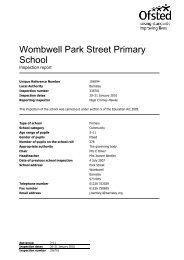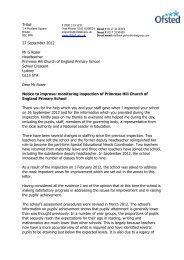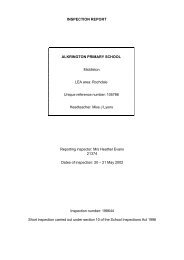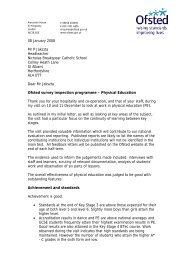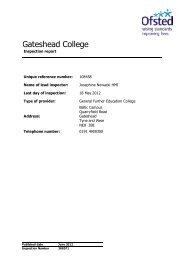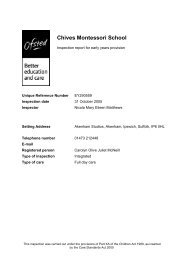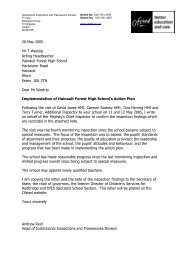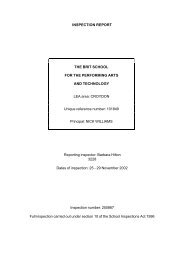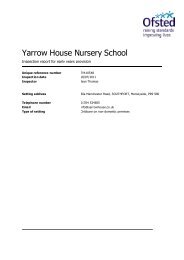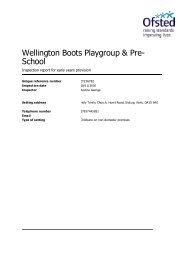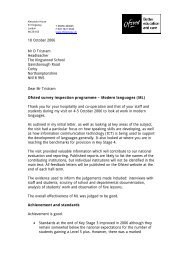CTC Kingshurst Academy: trading as Kingshurst Training - Ofsted
CTC Kingshurst Academy: trading as Kingshurst Training - Ofsted
CTC Kingshurst Academy: trading as Kingshurst Training - Ofsted
You also want an ePaper? Increase the reach of your titles
YUMPU automatically turns print PDFs into web optimized ePapers that Google loves.
<strong>CTC</strong> <strong>Kingshurst</strong> <strong>Academy</strong>: <strong>trading</strong><br />
<strong>as</strong> <strong>Kingshurst</strong> <strong>Training</strong><br />
Inspection report<br />
Unique reference number: 50150<br />
Name of lead inspector: Gerard McGrath HMI<br />
L<strong>as</strong>t day of inspection: 09 February 2012<br />
Type of provider: Independent learning provider<br />
Address:<br />
Published date 15 March 2012<br />
Inspection Number 384817<br />
PO Box 1017<br />
Cooks Lane<br />
<strong>Kingshurst</strong><br />
Birmingham<br />
B37 6NZ<br />
Telephone number: 0121 7881001
Inspection report : <strong>CTC</strong> <strong>Kingshurst</strong> <strong>Academy</strong>: <strong>trading</strong> <strong>as</strong> <strong>Kingshurst</strong> <strong>Training</strong>, 09 February 2012 1 of 19<br />
Information about the provider<br />
1. <strong>Kingshurst</strong> <strong>Training</strong> (<strong>Kingshurst</strong>) is the work-b<strong>as</strong>ed learning division of <strong>CTC</strong><br />
<strong>Kingshurst</strong> <strong>Academy</strong>. It offers work-b<strong>as</strong>ed learning for young people in early<br />
years and playwork and foundation learning programmes. <strong>Kingshurst</strong> works<br />
with two local schools and other agencies in the greater Birmingham area to<br />
deliver training in early years and play work from entry level through to level 3.<br />
Most learners are directly recruited from local schools.<br />
2. <strong>Training</strong> is offered at <strong>Kingshurst</strong>’s own centre and through an inner-city satellite<br />
centre in the Balsall Heath district of Birmingham. At the time of inspection<br />
there were 92 apprentices and 26 school students on early years and playwork<br />
programmes. A further 40 learners were on the foundation learning<br />
programme.<br />
3. The majority of apprentices attend off-the-job training at the training centre for<br />
one day each week; <strong>as</strong>sessment is carried out in the workplace. Functional skills<br />
support is delivered during learners’ time at the training centre. Seesaws Day<br />
Nursery employs about a third of the early years and playwork learners and<br />
<strong>Kingshurst</strong> <strong>Training</strong> subcontracts the training and <strong>as</strong>sessment of these learners<br />
to them.<br />
4. <strong>Kingshurst</strong> <strong>Training</strong> is funded through contracts with Birmingham and Solihull<br />
Skills Funding Agency and the Young People’s Learning Agency. <strong>Kingshurst</strong> also<br />
provides programmes for disengaged pupils and young people who are not in<br />
employment, education or training under contracts with two local authorities.<br />
5. The operations manager h<strong>as</strong> overall responsibility for <strong>Kingshurst</strong> <strong>Training</strong>. A<br />
new training manager took up her post in January 2012. The team employs a<br />
further two managers, 19 tutor/<strong>as</strong>sessors and three administrators.<br />
6. The unemployment rate in the West Midlands is higher than across the whole of<br />
England at 9.3%. The proportion of the population from minority ethnic groups<br />
varies considerably across the Greater Birmingham area served by the provider,<br />
but stands at around one third of the population in the city of Birmingham.<br />
7. The following organisations provide training on behalf of the provider:<br />
� Seesaws Nurseries (Child development and well being)<br />
� Teddys ‘n’ Daisy’s (Child development and well being)<br />
� Greater Heights (Child development and well being)
Inspection report : <strong>CTC</strong> <strong>Kingshurst</strong> <strong>Academy</strong>: <strong>trading</strong> <strong>as</strong> <strong>Kingshurst</strong> <strong>Training</strong>, 09 February 2012 2 of 19<br />
Type of provision Number of learners in 2010/2011<br />
Young learner provision:<br />
14-16<br />
Foundation learning, including Entry<br />
to Employment<br />
Employer provision:<br />
Apprenticeships<br />
66 learners<br />
102 learners<br />
27 learners<br />
179 apprentices
Inspection report : <strong>CTC</strong> <strong>Kingshurst</strong> <strong>Academy</strong>: <strong>trading</strong> <strong>as</strong> <strong>Kingshurst</strong> <strong>Training</strong>, 09 February 2012 3 of 19<br />
Summary report<br />
Grades: 1 is outstanding; 2 is good; 3 is satisfactory; 4 is inadequate<br />
Overall effectiveness of provision Grade 3<br />
Capacity to improve Grade 3<br />
Grade<br />
Outcomes for learners 3<br />
Quality of provision 3<br />
Leadership and management 3<br />
Safeguarding<br />
Equality and diversity<br />
Subject Are<strong>as</strong> Grade<br />
Child development and well being 3<br />
Foundation learning 3<br />
Overall effectiveness<br />
8. <strong>Kingshurst</strong> is a satisfactory provider of work-b<strong>as</strong>ed learning. It h<strong>as</strong> maintained<br />
the quality of provision and improved outcomes for learners in line with national<br />
trends since the l<strong>as</strong>t inspection. The proportion of learners on childcare<br />
advanced apprenticeship programmes who complete their studies satisfactorily,<br />
is slightly above the national average. The great majority of learners make<br />
adequate progress and complete their programmes within the planned time.<br />
Learners enjoy their training. Many learners go on to further training or gain<br />
promotion at work.<br />
9. Teaching and learning are satisfactory. Individual coaching from tutors and<br />
workplace <strong>as</strong>sessors <strong>as</strong> well <strong>as</strong> the training provided directly by employers in<br />
the workplace are effective and help learners to develop good social and workrelated<br />
skills. Lessons are adequately planned and resources in the training<br />
centre are good, but make too little use of information and communication<br />
technology (ICT) to support learning. <strong>Kingshurst</strong>’s programmes meet the needs<br />
of learners and employers.<br />
10. The care, guidance and support for foundation learners are good. <strong>Kingshurst</strong><br />
staff accurately <strong>as</strong>sess the support needs of their learners and provide effective<br />
3<br />
2
Inspection report : <strong>CTC</strong> <strong>Kingshurst</strong> <strong>Academy</strong>: <strong>trading</strong> <strong>as</strong> <strong>Kingshurst</strong> <strong>Training</strong>, 09 February 2012 4 of 19<br />
individual programmes of support, especially for those with social barriers to<br />
learning and employment.<br />
11. Leaders and managers satisfactorily promote ambition and improve outcomes<br />
for individual learners. Governance arrangements have recently improved to<br />
provide better oversight of the provision. However, performance targets in<br />
strategic plans are insufficiently challenging. <strong>Kingshurst</strong> works particularly well<br />
with schools, employers, funding bodies and community agencies to promote<br />
learning, particularly to those from are<strong>as</strong> of socio-economic deprivation.<br />
12. <strong>Kingshurst</strong> makes satisfactory use of the feedback collected from learners to<br />
make improvements to the provision. Quality improvement arrangements are<br />
satisfactory. Self-<strong>as</strong>sessment processes are well established. However, the<br />
views of employers were not collected formally to support the current self<strong>as</strong>sessment<br />
report.<br />
Main findings<br />
� Outcomes for learners are satisfactory. Success rates on childcare apprentice<br />
programmes have steadily improved and are around national averages.<br />
Advanced apprenticeship success rates are higher than the intermediate level.<br />
The proportion of apprentices who achieve within the planned duration of their<br />
training is also improving and is at the national average. Learners develop the<br />
expected level of knowledge and understanding of the needs of the children in<br />
their care.<br />
� Learners’ achievements on the previous Entry to Employment (E2E) foundation<br />
programme were satisfactory with around 44% achieving a positive progression<br />
in 2009/10 and a high proportion achieving their individual learning goals.<br />
Qualification success rates for learners on the new ‘Step up’ foundation<br />
programmes are a little above the national average. All learners make the<br />
expected rate of progress towards their qualifications.<br />
� Learners enjoy their training and attendance at formal training sessions is<br />
satisfactory. Foundation learners develop good social skills and improve their<br />
employability. Childcare learners incre<strong>as</strong>e their understanding of children’s<br />
development, the national curriculum and become better employees <strong>as</strong> a result<br />
of their learning.<br />
� <strong>Kingshurst</strong> and employers place a good emph<strong>as</strong>is on the health and welfare of<br />
learners. Learners feel very safe at work and in the training centre. Learners<br />
have an appropriate understanding of health and safety and safeguarding<br />
topics and demonstrate safe working practices.<br />
� Teaching and learning are satisfactory. Resources to support learning in the<br />
training centre are good. Lessons are appropriately planned and better sessions<br />
contain a range of activities to engage and challenge all learners. However,<br />
tutors make little use of ICT and the more able learners find some t<strong>as</strong>ks<br />
repetitive and uninspiring.
Inspection report : <strong>CTC</strong> <strong>Kingshurst</strong> <strong>Academy</strong>: <strong>trading</strong> <strong>as</strong> <strong>Kingshurst</strong> <strong>Training</strong>, 09 February 2012 5 of 19<br />
� Initial <strong>as</strong>sessment of learners’ literacy and numeracy skills is used satisfactorily<br />
to plan support for individual learners. A suitable range of <strong>as</strong>sessment<br />
strategies is used to collect evidence of work-related skill development.<br />
Progress reviews are effective at encouraging learners to complete <strong>as</strong>signments<br />
and work t<strong>as</strong>ks. However, progress targets are not sufficiently challenging for<br />
more able learners and learners do not fully understand the structure of the<br />
apprenticeship and the study demands of their learning programmes.<br />
� Learning resources are satisfactory. Accommodation in the newly built training<br />
centre is good. Learners have a comfortable and well-decorated leisure area.<br />
Learning resources in the training centre are good for those who attend formal<br />
off-the-job training sessions.<br />
� Programmes are satisfactorily matched to the needs of employers and learners.<br />
The range of provision offers good progression routes from entry level awards<br />
to advanced apprenticeships in childcare. <strong>Kingshurst</strong> introduces prospective<br />
learners to employers with current vacancies and helps them to make<br />
appropriate applications. Foundation learners are helped to improve their social<br />
skills and improve their employment prospects.<br />
� Support for foundation learners is good. Typically they have poor experiences<br />
of education and face multiple barriers to employment and education. Tutors<br />
work well to provide an environment of care and support and work well with<br />
partner organisations to meet the personal and social support needs of<br />
individual learners. Effective support for apprentices helps them to make at<br />
le<strong>as</strong>t the progress expected of them, given the low level of previous academic<br />
achievement.<br />
� Strategies to improve outcomes for learners are satisfactory. <strong>Kingshurst</strong> h<strong>as</strong><br />
made good use of their system of tracking learner activities and achievement to<br />
improve the monitoring and management of individual learner’s progress.<br />
Learners’ progress is examined closely and used to develop effective training<br />
strategies to support learners who are identified <strong>as</strong> at risk of slowing, or leaving<br />
training.<br />
� Safeguarding arrangements meet government requirements. All staff undergo<br />
Criminal Record Bureau (CRB) checks and attend adequate update training on<br />
related topics. All childcare learners undergo CRB checks before starting work in<br />
day nurseries. All learners receive information about safeguarding throughout<br />
their training and have a re<strong>as</strong>onable understanding.<br />
� The promotion of equality and diversity is good. <strong>Kingshurst</strong> works very well with<br />
local authorities, schools and other partners to promote learning, particularly<br />
successfully to young people in wards of significant socio-economic deprivation.<br />
Most learners come from very low levels of prior achievement and receive good<br />
support to overcome their barriers to training and employment.<br />
� Quality improvement arrangements are satisfactory. <strong>Kingshurst</strong> collects formal<br />
feedback from learners at regular intervals, however, arrangements for the<br />
collection of the views of employers and the parents of young learners are<br />
informal and insufficiently structured. Observations of teaching and learning are<br />
routinely carried out and the recently improved system focuses appropriately on
Inspection report : <strong>CTC</strong> <strong>Kingshurst</strong> <strong>Academy</strong>: <strong>trading</strong> <strong>as</strong> <strong>Kingshurst</strong> <strong>Training</strong>, 09 February 2012 6 of 19<br />
the experiences of learners. However, staff appraisals do not have qualityrelated<br />
performance targets and some organisational quality improvement<br />
targets are insufficiently challenging.<br />
What does <strong>Kingshurst</strong> need to do to improve further?<br />
� Develop the use of ICT and multimedia methods to improve the quality of<br />
teaching and the presentation of learners’ work through staff training and by<br />
encouraging learners to use these methods to collect evidence in their<br />
portfolios.<br />
� Improve target setting for learners by incre<strong>as</strong>ing the challenge for the more<br />
able learners.<br />
� Ensure tutors focus on the improvement of teaching and learning by meeting<br />
the individual learning needs of all learners and improved use of ICT during offthe-job<br />
training sessions.<br />
� Analyse and use available data to identify a range of specific, challenging<br />
performance and quality improvement targets for the organisation <strong>as</strong> a whole<br />
and individual staff.<br />
� Improve the collection and use of feedback from all interested parties, including<br />
employers and parents of younger learners.<br />
Summary of the views of users <strong>as</strong> confirmed by inspectors<br />
What learners like:<br />
� the helpful and clear explanations about <strong>as</strong>sessment<br />
� the friendly and supportive staff who are e<strong>as</strong>y to talk to<br />
� the system of ‘trainee of the month’<br />
� work place training sessions<br />
� the link between theory and practice that apprenticeships provide<br />
� learning something to help their future career ambitions<br />
� improving their job prospects<br />
� progressing to the apprenticeship<br />
� that foundation learning programme is not like school.<br />
What learners would like to see improved:<br />
� clearer information about <strong>as</strong>signments<br />
� a simple overview of their progress in learning<br />
� a greater choice of food in the vending machines<br />
� more comfortable chairs<br />
� the quality of the teaching
Inspection report : <strong>CTC</strong> <strong>Kingshurst</strong> <strong>Academy</strong>: <strong>trading</strong> <strong>as</strong> <strong>Kingshurst</strong> <strong>Training</strong>, 09 February 2012 7 of 19<br />
� more challenge in some t<strong>as</strong>ks.<br />
Summary of the views of employers <strong>as</strong> confirmed by inspectors<br />
What employers like:<br />
� the open, honest approach of <strong>as</strong>sessors<br />
� that the training provided in the nursery reduces time away from work by<br />
learners<br />
� email updates and effective communication<br />
� the continuity of <strong>as</strong>sessor relationships<br />
� opportunities to attend standardisation meetings.<br />
What employers would like to see improved:<br />
� none identified.
Inspection report : <strong>CTC</strong> <strong>Kingshurst</strong> <strong>Academy</strong>: <strong>trading</strong> <strong>as</strong> <strong>Kingshurst</strong> <strong>Training</strong>, 09 February 2012 8 of 19<br />
Main inspection report<br />
Capacity to make and sustain improvement Grade 3<br />
13. Senior leaders provide effective leadership for the company. Staff are focused<br />
strongly on meeting learners’ needs. Learners’ and employers’ feedback on the<br />
quality of provision is positive. Success rates and the proportion of learners who<br />
complete within the planned duration of their programmes have improved since<br />
the l<strong>as</strong>t inspection and remain satisfactory. Inspection grades for childcare<br />
programmes, leadership and management and overall effectiveness have been<br />
maintained. Arrangements for quality improvement remain satisfactory.<br />
<strong>Kingshurst</strong> makes effective use of learners’ feedback to improve provision. The<br />
development action plan is realistic, although it is not supported by me<strong>as</strong>urable<br />
success milestones. The observation of teaching and learning process h<strong>as</strong><br />
recently been improved, but requires further improvement before it can work<br />
effectively <strong>as</strong> a quality improvement tool. Self-<strong>as</strong>sessment is well established.<br />
The company accurately identified most of the strengths and some of the are<strong>as</strong><br />
for improvement found by inspectors. However, the report is overly descriptive<br />
and makes insufficient use of formal feedback from employers. Inspectors gave<br />
the same grade for some <strong>as</strong>pects of provision <strong>as</strong> those in the self-<strong>as</strong>sessment<br />
report.<br />
Outcomes for learners Grade 3<br />
14. Overall success rates on apprenticeship programmes are satisfactory. Success<br />
rates on childcare advanced apprenticeships are slightly above national<br />
averages. Childcare apprentices develop good practical skills which are<br />
recognised by their employers. Foundation learners develop appropriate<br />
standards of CV writing and interview skills <strong>as</strong> well <strong>as</strong> improved self confidence,<br />
which are very useful in improving their employability. Foundation learners also<br />
improve their communication skills and punctuality throughout the programme.<br />
The organisation analyses the performance of different groups of learners and<br />
currently there are no achievement gaps. The quality of work in portfolios is<br />
satisfactory. Learners enjoy their training and make appropriate progress<br />
towards their qualifications. Sufficient emph<strong>as</strong>is is placed on the health and<br />
welfare of learners and they feel safe. Learners improve their own health<br />
through their greater awareness of health issues <strong>as</strong>sociated with their training<br />
programme. Learners make an appropriate contribution to their local<br />
communities through a range of charitable fund-raising and local environment<br />
improvement activities.
Inspection report : <strong>CTC</strong> <strong>Kingshurst</strong> <strong>Academy</strong>: <strong>trading</strong> <strong>as</strong> <strong>Kingshurst</strong> <strong>Training</strong>, 09 February 2012 9 of 19<br />
The quality of provision Grade 3<br />
15. Teaching and learning are satisfactory. Formal teaching sessions are mostly<br />
satisfactory, and some are good. The better sessions are well-planned with a<br />
good range of activities to challenge all learners, including detailed discussions<br />
on current affairs relevant to the local area or childcare. However, too little use<br />
is made of available ICT. Assessors provide effective workplace coaching and<br />
support to build learners’ confidence and skills. Employers provide good<br />
additional in-house training on relevant topics. Apprentices demonstrate a<br />
satisfactory understanding of the developmental stages of the children in their<br />
care. Learning resources at the training centre are good.<br />
16. Learners’ progress reviews are effective. The targets set for learners encourage<br />
them to progress appropriately. <strong>Kingshurst</strong> shares information on learners’<br />
progress with employers so that they can contribute to the learners’<br />
development. Learners’ understanding of equality and safeguarding issues are<br />
sufficiently explored and reinforced.<br />
17. <strong>Kingshurst</strong>’s provision is effective in meeting the needs and interests of learners<br />
and employers. Programmes are designed to meet the employers’ need to<br />
provide appropriately qualified staff in child care settings. <strong>Kingshurst</strong> adequately<br />
relates the content of employers’ in-house training and the workplace<br />
experiences of learners to the childcare apprenticeship frameworks. Learners<br />
often progress from intermediate level to advanced apprenticeships. <strong>Kingshurst</strong><br />
makes good use of its partnerships to develop programmes for local young<br />
people who are at risk of becoming disaffected with school or who are not in<br />
education, employment or training, particularly in are<strong>as</strong> of socio-economic<br />
deprivation.<br />
18. <strong>Kingshurst</strong> provides good guidance and support for foundation learners. Initial<br />
advice and guidance is effective. Career advice is good for childcare<br />
apprentices. Staff are approachable, flexible and responsive to learners’<br />
individual and social support needs which is particularly important <strong>as</strong> many of<br />
the learners have low previous academic achievement and significant barriers to<br />
education and employment. <strong>Kingshurst</strong> h<strong>as</strong> successfully improved the support<br />
for learners with low literacy, numeracy and language skills since the l<strong>as</strong>t<br />
inspection.<br />
Leadership and management Grade 3<br />
19. The governors and senior managers provide appropriate strategic direction. A<br />
new sub-group of governors h<strong>as</strong> recently been formed to provide greater<br />
oversight and challenge. Senior managers place a high emph<strong>as</strong>is on promoting<br />
ambition for learners. Staff understand and fully support the aims of the<br />
provision. Regular appraisals are used to monitor staff performance and define
Inspection report : <strong>CTC</strong> <strong>Kingshurst</strong> <strong>Academy</strong>: <strong>trading</strong> <strong>as</strong> <strong>Kingshurst</strong> <strong>Training</strong>, 09 February 2012 10 of 19<br />
training needs. However, staff performance targets are insufficiently challenging<br />
and are insufficiently focused on improving the quality of teaching and learning.<br />
20. Managers make good use of learner progress tracking systems to monitor and<br />
improve success rates. Since the previous inspection the tracking and recording<br />
of learners’ progress h<strong>as</strong> improved. Regular meetings are held at all levels<br />
throughout <strong>Kingshurst</strong> to analyse learner’s progress. Targets for learners’<br />
progress are also used during staff appraisals to manage staff performance.<br />
Where learners make slow progress, have poor attendance at off-the-job<br />
training or identify significant social issues during reviews, staff agree effective<br />
support and <strong>as</strong>sessment plans.<br />
21. <strong>Kingshurst</strong> works satisfactorily with employers and other partners to plan<br />
developments to the provision. Subcontractors and employers value the close<br />
working relationship with <strong>Kingshurst</strong> and the guidance they have received from<br />
the provider. The management of the subcontractors is satisfactory. Service<br />
level agreements are clear and communications are frequent and regular.<br />
22. Formal safeguarding arrangements meet current requirements. CRB checks are<br />
completed on all appropriate staff and all staff have recently completed relevant<br />
updates on safeguarding topics. Managers have successfully promoted a culture<br />
of care for learners and prompt actions are taken when concerns are identified.<br />
Learners feel safe in childcare work environments and have an adequate<br />
understanding of safeguarding issues. Sufficient emph<strong>as</strong>is is placed on e-safety<br />
while using the internet to support learning.<br />
23. The provider manages equality and diversity well. Relevant policies and<br />
procedures are up to date and regularly reviewed. <strong>Kingshurst</strong> h<strong>as</strong> successfully<br />
recruited from minority ethnic groups, who now make up approximately one<br />
third of the staff. The organisation does not tolerate inappropriate behaviour.<br />
Wall displays in the training centre strongly promote respect for others. Staff<br />
understanding of equality and diversity is good. It is adequately covered at staff<br />
induction and regular staff meetings. Assessors make sufficient use of<br />
opportunities to reinforce the learners’ knowledge of relevant topics during<br />
reviews.<br />
24. <strong>Kingshurst</strong> promotes and supports learning particularly well in are<strong>as</strong> of socioeconomic<br />
deprivation. The provider works well with local authorities and<br />
schools to identify are<strong>as</strong> of high need. The provision h<strong>as</strong> deliberately been<br />
expanded to include programmes that support young parents across the<br />
greater Birmingham area and disaffected school pupils at risk of leaving<br />
education. Achievement rates across all programmes have improved and there<br />
are no achievement gaps between groups of learners. Staff attend a good<br />
number of careers events to promote training, however, strategies to incre<strong>as</strong>e<br />
the number of male learners on childcare courses have been unsuccessful.<br />
25. Self-<strong>as</strong>sessment is a well established and inclusive process. The <strong>as</strong>sociated<br />
development action points are realistic although not supported by specific
Inspection report : <strong>CTC</strong> <strong>Kingshurst</strong> <strong>Academy</strong>: <strong>trading</strong> <strong>as</strong> <strong>Kingshurst</strong> <strong>Training</strong>, 09 February 2012 11 of 19<br />
success milestones. The company accurately identified most of the strengths<br />
and some of the are<strong>as</strong> for improvement found by inspectors. However, the<br />
report is overly descriptive and does not refer often enough to available data or<br />
formal feedback collected from employers. Inspectors agree with some of the<br />
self-<strong>as</strong>sessment grades for the <strong>as</strong>pects of provision.<br />
26. The recently improved system for observing teaching and learning is<br />
satisfactory. Regular observations of other key <strong>as</strong>pects of the provision have<br />
also been carried out. Detailed feedback is provided to tutors to identify needs<br />
for training and development. Clear criteria for judgements have been agreed<br />
and these place appropriate emph<strong>as</strong>is on the learners’ experience; however,<br />
the grades proposed by the previous system were over-generous. The quality<br />
of teaching and learning remains satisfactory, <strong>as</strong> at the previous inspection.<br />
27. The provider makes effective use of resources and provides satisfactory value<br />
for money. The newly-built training centre offers good accommodation and<br />
contains a good range of learning resources. However, tutors make little use of<br />
available ICT. Assessors’ workloads are satisfactory. However, foundation tutors<br />
hold insufficient qualifications to provide literacy and numeracy support.
Inspection report : <strong>CTC</strong> <strong>Kingshurst</strong> <strong>Academy</strong>: <strong>trading</strong> <strong>as</strong> <strong>Kingshurst</strong> <strong>Training</strong>, 09 February 2012 12 of 19<br />
Subject Are<strong>as</strong><br />
Child development and well being Grade 3<br />
Context<br />
28. <strong>Kingshurst</strong> <strong>Training</strong> offers apprenticeships in childcare at intermediate and<br />
advanced levels for 92 learners. It works in partnership with a number of<br />
nursery providers to deliver the training in early years settings. The majority of<br />
the learners are between 16 and 18 years of age with a small proportion over<br />
25. Most learners attend off-the-job training either in the workplace or at the<br />
<strong>Kingshurst</strong> training centre while the remaining training takes place at work<br />
through one-to-one contact with <strong>as</strong>sessors.<br />
Key findings<br />
� Overall success rates and the proportion of childcare apprentices who achieve<br />
within the planned duration of their training have improved since the previous<br />
inspection and are satisfactory. The overall success rate for advanced<br />
apprentices in 2010/11 w<strong>as</strong> a little above the national average at 82% while the<br />
success rate for intermediate apprentices w<strong>as</strong> slightly below the national<br />
average at 68%.<br />
� Learners make timely progress, broaden their understanding of the needs of<br />
children and babies and gain confidence. They develop good levels of skill in<br />
childcare practice, including the ability to help children develop their motor<br />
skills. Learners enjoy their programmes and develop the numeracy and literacy<br />
skills necessary to succeed. Learners’ evidence portfolios are satisfactory, but<br />
there is insufficient use of ICT.<br />
� Learners improve their economic and social wellbeing well through their work<br />
experience and they demonstrate good childcare skills. Learners often gain<br />
promotion <strong>as</strong> they progress through the qualification levels. Most take pride in<br />
their written work and develop skills in reflective practice to support their<br />
learning. They are aware of career development opportunities and available<br />
training which support these.<br />
� Learners feel safe. They have good awareness of health and safety procedures<br />
and incre<strong>as</strong>e their understanding of their importance including, for example, the<br />
importance of risk <strong>as</strong>sessments in nurseries. Learners undertake safe working<br />
practices for food handling and micro-bacterial cleaning. Learners have a good<br />
understanding of relevant safeguarding issues and the actions to take if they<br />
have concerns.<br />
� Teaching is effective in promoting the progress of learners. However, learners<br />
find some teaching dull, especially where there is an over-reliance on reading<br />
and writing and a narrow range of activities are included in sessions. Teaching<br />
is often carried out in small groups that promote professional discussion well<br />
and build learners’ confidence. A good range of practical learning resources is<br />
used well, although available ICT is used too little to promote learners
Inspection report : <strong>CTC</strong> <strong>Kingshurst</strong> <strong>Academy</strong>: <strong>trading</strong> <strong>as</strong> <strong>Kingshurst</strong> <strong>Training</strong>, 09 February 2012 13 of 19<br />
engagement. Constructive feedback is regularly given to learners who<br />
appreciate the guidance on how to improve.<br />
� Assessment is satisfactory. The results of initial <strong>as</strong>sessment are used<br />
appropriately to plan support for individual learners. The time and place for<br />
<strong>as</strong>sessment is organised flexibly to meet learners’ and employers’ needs. Target<br />
setting in reviews encourage learners to progress with their work t<strong>as</strong>ks.<br />
However, learners are often unsure of their achievements and how much work<br />
remains for them to complete their qualifications.<br />
� Assessment activities are satisfactorily coordinated with employers and<br />
effectively link theory to practice. This is an improvement since the l<strong>as</strong>t<br />
inspection that ensures learners skills and knowledge are built upon. Most<br />
learners have a good awareness of the requirements of the apprenticeship<br />
framework. Internal verification is satisfactory and recording is clear and well<br />
documented.<br />
� Care, guidance and support are very effective in supporting learners’ progress<br />
through their programmes, particularly in view of the poor school experiences<br />
and low levels of previous academic achievement and their significant social<br />
barriers to education and employment. Flexible and regular visits by <strong>as</strong>sessors<br />
benefit the learners and early evening visits are made where necessary.<br />
Learners appreciate the support which is always readily available from staff at<br />
<strong>Kingshurst</strong>.<br />
� Communication is good within the training team who work well together to<br />
benefit the learners. A comprehensive computer tracking system h<strong>as</strong> been<br />
developed since the previous inspection and is now used effectively to track<br />
learner’s progress.<br />
� Learners’ safety is thoroughly checked at the workplaces before training<br />
commences. Learners complete a CRB check during their induction and do not<br />
start working with children until clearance h<strong>as</strong> been received. Learners have a<br />
good awareness of the importance of safeguarding the children in their care.<br />
� Marketing materials contain a range of good images. The learner ethnicity<br />
profile matches that of the local population well and many learners are<br />
recruited from are<strong>as</strong> of socio-economic deprivation. Variations in success rates<br />
between different groups of learners have been reduced and all groups now<br />
succeed equally well. However, males are under-represented on childcare<br />
programmes. Equality and diversity content in learning resources are<br />
satisfactory with comprehensive booklets produced to promote learners<br />
understanding of relevant topics.<br />
� Communication with employers is regular and relationships with employers,<br />
including the subcontractors, are very effective. Employers value the personal<br />
contact they have with staff and feel well supported. A few employers have<br />
attended useful vocational briefing sessions run by the provider and attended<br />
<strong>as</strong>sessment standardisation meetings.<br />
� <strong>Kingshurst</strong> regularly collects formal feedback from learners through surveys and<br />
lesson evaluations but no learner forum exists to allow learners to compare<br />
their experiences and identify are<strong>as</strong> for improvement. The content of the self-
Inspection report : <strong>CTC</strong> <strong>Kingshurst</strong> <strong>Academy</strong>: <strong>trading</strong> <strong>as</strong> <strong>Kingshurst</strong> <strong>Training</strong>, 09 February 2012 14 of 19<br />
<strong>as</strong>sessment report is broadly accurate but inspectors awarded a lower grade for<br />
the childcare provision. Staff have satisfactory involvement in the self<strong>as</strong>sessment<br />
process but there is insufficient employer input.<br />
What does <strong>Kingshurst</strong> need to do to improve further?<br />
� Improve review interviews to ensure that learners have a clear understanding<br />
of their achievements and rate of progress towards their qualifications.<br />
� Develop the use of ICT and multimedia methods of <strong>as</strong>sessing learner work and<br />
encourage learners to use these methods to contribute to their portfolios of<br />
evidence.<br />
� Improve the quality of teaching in formal sessions so that learners are<br />
sufficiently challenged and inspired.<br />
� Develop formal arrangements for employers’ involvement in the self<strong>as</strong>sessment<br />
process.<br />
� Develop effective strategies to actively promote participation in childcare<br />
courses by males.
Inspection report : <strong>CTC</strong> <strong>Kingshurst</strong> <strong>Academy</strong>: <strong>trading</strong> <strong>as</strong> <strong>Kingshurst</strong> <strong>Training</strong>, 09 February 2012 15 of 19<br />
Foundation learning Grade 3<br />
Context<br />
29. <strong>Kingshurst</strong> <strong>Training</strong> delivers foundation learning programmes to 40 learners. Six<br />
learners are working towards a vocational option in addition to health and<br />
safety, personal and social development, employability and functional skills. Ten<br />
learners are also working towards an effective parenting certificate. Courses are<br />
delivered mostly in the provider’s training centre with the parenting<br />
programmes being delivered at two local children’s centres. The foundation<br />
learning programmes and functional skills courses are both managed by fulltime<br />
co-ordinators.<br />
Key findings<br />
� Outcomes for learners are satisfactory. Many learners’ progress to<br />
apprenticeships and other learning programmes or employment. Overall,<br />
qualification success rates are improved and now broadly similar to the national<br />
rates. Learners’ work is of a satisfactory standard. Many learners’ starting points<br />
were particularly low. Most learners make satisfactory progress towards their<br />
qualifications.<br />
� Learners develop good employability and personal skills. Most learners can<br />
identify how the programme is helping them to prepare for work or further<br />
training. Some learners have improved their confidence and communication<br />
skills.<br />
� Learners feel safe. They learn about their rights and responsibilities. Many<br />
learners have a good awareness of internet safety <strong>as</strong>pects. Learners incre<strong>as</strong>e<br />
their knowledge about healthy eating and safe health practices.<br />
� Teaching and learning are satisfactory. In better lessons, tutors use a good<br />
range of strategies to engage learners successfully in learning. Most tutors are<br />
experienced in breaking down skills into manageable steps for learners to gain<br />
confidence and success. In other sessions tutors do not sufficiently differentiate<br />
learning and offer insufficient challenge for more able learners. Most tutors use<br />
an appropriate range of <strong>as</strong>sessment methods to check learning.<br />
� Target setting in reviews is satisfactory. Subject tutors help their learners to<br />
review their progress every six weeks. Learners are encouraged to review their<br />
own progress and set themselves personal and programme targets. However,<br />
targets for more able learners are not sufficiently challenging. Longer-term<br />
targets are also reviewed regularly and are appropriately adjusted to suit<br />
learners’ individual needs.<br />
� Learners have good opportunities to gain a range of qualifications. Foundation<br />
learners are able to gain individual certificates in employability studies, health<br />
and safety and functional skills <strong>as</strong> part of their programme. Less than half of<br />
learners have been successful in gaining functional skills qualifications. There
Inspection report : <strong>CTC</strong> <strong>Kingshurst</strong> <strong>Academy</strong>: <strong>trading</strong> <strong>as</strong> <strong>Kingshurst</strong> <strong>Training</strong>, 09 February 2012 16 of 19<br />
are new strategies in place for the delivery of functional skills. However, these<br />
have yet to impact on outcomes for learners.<br />
� Tutors build positive relationships with local schools, especially the <strong>Academy</strong><br />
with which it shares a site, external agencies and community partners. The<br />
provider h<strong>as</strong> developed good programmes for 14-16 year olds from the<br />
<strong>Academy</strong> and for those young people not in education, employment or training<br />
in <strong>as</strong>sociation with local authorities. Good links with local companies support<br />
work-related learning projects. These help learners to develop their literacy,<br />
numeracy and IT skills. However, local employers are not used sufficiently to<br />
deliver and design the curriculum.<br />
� Support for learners is good. Tutors work closely together to identify and meet<br />
individual learners’ needs. Many learners have had poor experiences of<br />
education and many have serious personal issues. Tutors carry out home visits,<br />
and liaise with a range of external organisations to help learners deal with<br />
social and family problems.<br />
� Management of foundation learning is satisfactory. Staff are focused on raising<br />
the <strong>as</strong>pirations and achievements of learners. Tutors and other staff informally<br />
discuss programme and learner matters frequently. Monthly formal meetings<br />
take place where individual learners’ progress is routinely discussed and weekly<br />
communication meetings take place between the function skills team where<br />
teaching and learning issues are addressed.<br />
� Most tutors have qualifications in teaching and some are working towards a<br />
higher level. Not all tutors teaching literacy and numeracy are sufficiently<br />
qualified. The formal planning for staff development is insufficient to improve<br />
the quality of teaching and learning.<br />
� Equality and diversity are satisfactorily promoted at induction and reinforced<br />
appropriately by tutors throughout the programme. Staff understand the varied<br />
needs of their learners very well. Learners have an adequate understanding of<br />
broad equality and diversity matters and a good understanding of their relevant<br />
rights and responsibilities. Staff attend a range of community events to promote<br />
training in are<strong>as</strong> of socio-economic deprivation. Achievement gaps have been<br />
successfully narrowed and all groups succeed equally well.<br />
� Targets for staff performance are insufficiently challenging. Programme coordinators<br />
have targets regarding the recruitment of new learners. However,<br />
targets insufficiently focus on quality improvement or outcomes for learners.<br />
What does <strong>Kingshurst</strong> need to do to improve further?<br />
� Continue to implement improvement strategies for the successful delivery of<br />
functional skills programmes.<br />
� Improve tutors’ ability to meet the needs of all learners during teaching<br />
sessions through staff development and by providing more opportunities for<br />
tutors to share good practice.<br />
� Improve target setting for learners in reviews by incre<strong>as</strong>ing the challenge<br />
offered to more able learners.
Inspection report : <strong>CTC</strong> <strong>Kingshurst</strong> <strong>Academy</strong>: <strong>trading</strong> <strong>as</strong> <strong>Kingshurst</strong> <strong>Training</strong>, 09 February 2012 17 of 19<br />
� Systematically review the continuing professional development for staff to<br />
ensure that all tutors have up appropriate training and qualifications to deliver<br />
literacy and numeracy support.<br />
� Develop more links with employers to better support learners’ understanding of<br />
employment and offer work placement opportunities.<br />
� Ensure staff targets include a strong focus on improving the quality of teaching<br />
<strong>as</strong> well <strong>as</strong> learners’ achievements.
Inspection report : <strong>CTC</strong> <strong>Kingshurst</strong> <strong>Academy</strong>: <strong>trading</strong> <strong>as</strong> <strong>Kingshurst</strong> <strong>Training</strong>, 09 February 2012 18 of 19<br />
Information about the inspection<br />
30. One of Her Majesty’s Inspectors (HMI) and three additional inspectors, <strong>as</strong>sisted<br />
by the provider’s training manager, <strong>as</strong> nominee, carried out the inspection.<br />
Inspectors also took account of the provider’s most recent self-<strong>as</strong>sessment<br />
report and development plans, comments from the funding bodies, the previous<br />
inspection report, reports from the inspectorate’s quality monitoring inspection,<br />
and data on learners and their achievement over the period since the previous<br />
inspection.<br />
31. Inspectors used group and individual interviews, telephone calls and emails to<br />
gain the views of learners and employers. They also looked at questionnaires<br />
learners and employers had recently completed for the provider. They observed<br />
learning sessions, <strong>as</strong>sessments and progress reviews. Inspectors collected<br />
evidence from programmes in each of the subject are<strong>as</strong> the provider offers.
Inspection report : <strong>CTC</strong> <strong>Kingshurst</strong> <strong>Academy</strong>: <strong>trading</strong> <strong>as</strong> <strong>Kingshurst</strong> <strong>Training</strong>, 09 February 2012 19 of 19<br />
Record of Main Findings (RMF)<br />
<strong>CTC</strong> <strong>Kingshurst</strong> <strong>Academy</strong>: <strong>trading</strong> <strong>as</strong> <strong>Kingshurst</strong> <strong>Training</strong><br />
Learning types: 14 – 16: Young apprenticeships; Diplom<strong>as</strong>; 16-18 Learner responsive: FE full- and part-time courses,<br />
Foundation learning tier, including Entry to Employment; 19+ responsive: FE full- and part-time courses; Employer<br />
responsive: Train to Gain, apprenticeships<br />
Grades using the 4 point scale<br />
1: Outstanding; 2: Good;<br />
3: Satisfactory; 4: Inadequate<br />
Approximate number of enrolled learners<br />
Full-time learners<br />
Part-time learners<br />
Outcomes for learners 3 3 3 3<br />
How well do learners achieve and enjoy their learning? 3<br />
� How well do learners attain their learning goals?<br />
� How well do learners progress?<br />
How well do learners improve their economic and social well-being through<br />
learning and development?<br />
How safe do learners feel? 2<br />
Are learners able to make informed choices about their own health and well<br />
being?*<br />
3<br />
How well do learners make a positive contribution to the community?* 3<br />
Quality of provision 3 3 3 3<br />
How effectively do teaching, training and <strong>as</strong>sessment support learning and<br />
development?<br />
How effectively does the provision meet the needs and interests of users? 3<br />
How well partnerships with schools, employers, community groups and<br />
others lead to benefits for learners?<br />
How effective are the care, guidance and support learners receive in helping<br />
them to achieve?<br />
Leadership and management 3 3 3 3<br />
How effectively do leaders and managers raise expectations and promote<br />
ambition throughout the organisation?<br />
How effectively do governors and supervisory bodies provide leadership,<br />
direction and challenge?*<br />
How effectively does the provider promote the safeguarding of learners? 3<br />
How effectively does the provider actively promote equality and diversity,<br />
tackle discrimination and narrow the achievement gap?<br />
How effectively does the provider engage with users to support and<br />
promote improvement?<br />
How effectively does self-<strong>as</strong>sessment improve the quality of the provision<br />
and outcomes for learners?<br />
How efficiently and effectively does the provider use its available resources<br />
to secure value for money?<br />
*where applicable to the type of provision<br />
Overall<br />
3<br />
3<br />
2<br />
3<br />
3<br />
2<br />
3<br />
3<br />
2<br />
3<br />
3<br />
3<br />
16-18<br />
Learner<br />
responsive<br />
19+<br />
Learner<br />
responsive<br />
Overall effectiveness 3 3 3 3<br />
Capacity to improve 3<br />
40<br />
92<br />
14<br />
0<br />
26<br />
0<br />
Employer<br />
responsive<br />
0<br />
92
The Office for Standards in Education, Children’s Services and Skills (<strong>Ofsted</strong>) regulates and inspects to<br />
achieve excellence in the care of children and young people, and in education and skills for learners of<br />
all ages. It regulates and inspects childcare and children’s social care, and inspects the Children and<br />
Family Court Advisory Support Service (Cafc<strong>as</strong>s), schools, colleges, initial teacher training, work-b<strong>as</strong>ed<br />
learning and skills training, adult and community learning, and education and training in prisons and<br />
other secure establishments. It <strong>as</strong>sesses council children’s services, and inspects services for looked<br />
after children, safeguarding and child protection.<br />
If you would like a copy of this document in a different format, such <strong>as</strong> large print or Braille, ple<strong>as</strong>e<br />
telephone 0300 123 1231 or email enquiries@ofsted.gov.uk.<br />
You may copy all or parts of this document for non-commercial educational purposes, <strong>as</strong> long <strong>as</strong> you<br />
give details of the source and date of publication and do not alter the information in any way.<br />
To receive regular email alerts about new publications, including survey reports and school inspection<br />
reports, ple<strong>as</strong>e visit our website and go to ‘Subscribe’.<br />
<strong>Ofsted</strong><br />
Piccadilly Gate<br />
Store Street<br />
Manchester<br />
M1 2WD<br />
T: 0300 123 1231<br />
Textphone: 0161 618 8524<br />
E: enquiries@ofsted.gov.uk<br />
W: www.ofsted.gov.uk<br />
© Crown copyright 2012



